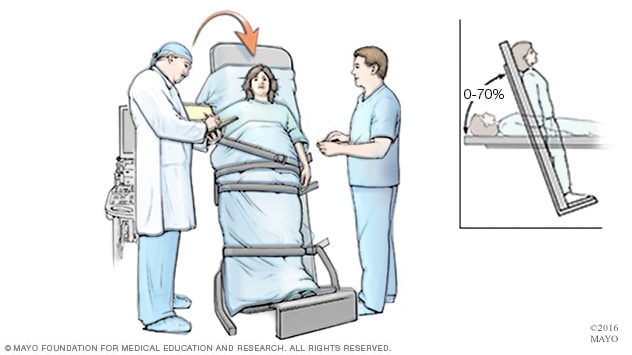Adolescent Autonomic Dysfunction Clinic
As part of the Mayo Clinic Children's Center, experts in our Adolescent Autonomic Dysfunction Clinic care for teenagers who have chronic dizziness, nausea, fatigue and often pain that's related to problems with the autonomic nervous system — the part of the nervous system that controls involuntary functions, such as heart rate, blood pressure, movement of contents through the digestive tract and body temperature.
One type of autonomic dysfunction is called postural orthostatic tachycardia syndrome (POTS). Signs and symptoms of POTS can vary but typically include an abnormally increased heart rate — and sometimes dizziness or fainting — when changing position from lying down to standing.
Initial Mayo Clinic visit
The typical patient coming to our Adolescent Autonomic Dysfunction Clinic has had symptoms for at least several months that interfere with academic and physical activities. The evaluation may include:
- Blood and urine tests to make sure there are no other specific treatable disorders contributing to the autonomic dysfunction
- Measures of heart function and autonomic testing, which includes a tilt table test
Some medications interfere with testing and might need to be stopped a few days before the tests. Details can be discussed at the time of appointment scheduling.
 Tilt table test
Tilt table test
Someone having a tilt table test begins by lying flat on a table. Straps hold the person in place. After lying flat for a while, the table is tilted to a position that mimics standing. The healthcare professional watches how the heart and the nervous system that controls it respond to the changes in position.
Team approach
During the Mayo Clinic visit, an experienced team of pediatric providers with expertise in autonomic disorders do an evaluation. If needed, part of the evaluation may include a pediatric neurologist, a pediatric gastroenterologist, a pediatric cardiologist or a pain specialist.
Patient education about the specific type of autonomic dysfunction is an important part of the treatment plan. A child psychologist may be involved to help in coping with any ongoing symptoms and to teach strategies to deal with them.
It usually takes a few days to complete an evaluation, determine an accurate diagnosis and customize a treatment plan tailored to the patient's specific needs. The goal goes beyond diagnostic discovery to actual recovery with significant improvement in quality of life.
Appointments
See information on how to make an appointment at Mayo Clinic Children's Center and learn about our patient services.